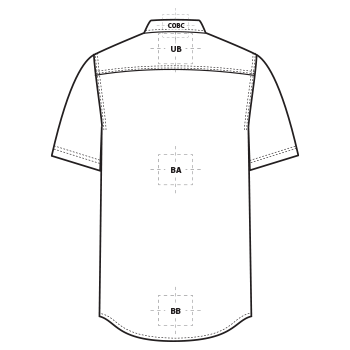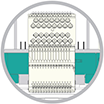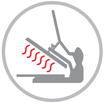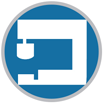


| Front Decoration Dimensions | |||
|---|---|---|---|
| COL | Collar Left | 1"H x 3"W | |
| COR | Collar Right | 1"H x 3"W | |
| LB | Left Bottom | 4"H x 4"W | |
| LC | Left Chest | 4"H x 4"W | Primary |
| LP | Left Pocket | 3"H x 3"W | |
| RB | Right Bottom | 4"H x 4"W | |
| RC | Right Chest | 4"H x 4"W | |
| Back Decoration Dimensions | |||
|---|---|---|---|
| BA | Back | 14"H x 14"W | |
| BB | Back Bottom | 6"H x 14"W | |
| COBC | Collar Back | 1"H x 4"W | |
| UB | Upper Back | 3"H x 12"W | |
| Sleeve Decoration Dimensions | |||
|---|---|---|---|
| LS | Left Shoulder | 4"H x 4"W | |
| RS | Right Shoulder | 4"H x 4"W | |
Decoration TechniquesClick the icon for details
Tips From Our Experts By Decoration Technique
Embroidery is the art of embellishing a piece of apparel with a needle and thread or yarn creating stunning visual representations of various types of art. This is achieved by converting logos in a digitizing software and using various stitch patterns, angles, density and stitch types to create depth, movement and detail. Thread can be made from many materials. The most commonly used threads are polyester and rayon. There are also options such as metallic, cotton, nylon, silk and even Nomex thread for fire resistance. Embroidery has a very high-perceived value and is popular for use on most apparel, bags, hats, luggage, blankets and more!
An imprinting method in which the image is transferred to the fabric. Ink is squeegeed through a stenciled screen stretched over a frame and then cured in a dryer.
A graphic, name and or number applied to a textile with a heat press. Great for quantities of any size, sports name and numbering, fashion, performance wear, print on demand programs and on-site decorating events.
Laser etching is a decorating process that burns a pattern into the top layer of fabric, giving it a subtle tone-on-tone appearance. The image the etching creates has an upscale look that is usually the same color but several shades darker than the original fabric's color. It works well with both big or small logos.
Test etch prior to production to dial in wattage and speed. Darker colors may not give you the desired outcome.Pad printing uses a soft silicone pad to transfer an image taken from a plate etched with a reversed logo, similar to a rubber stamp. Images can be very small and detailed and can be up to 5½ inches in diameter. Pad printers are capable of printing up to six colors, however most industry printers use one to two colors at most when printing on apparel. Pad printing is a popular trend for tagless label printing. The prints are soft, durable and capable of high and low volume production. Pad printing is great for sling bags, totes and other items that are difficult to decorate, as well as styles that are heat sensitive.
specialty frames and applications that are specific to a shop's setup and equipment.




